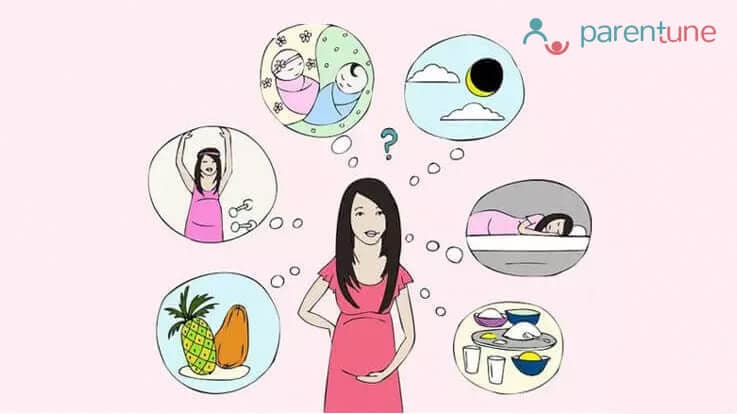8 Pregnancy Myths You Shouldn' ...
8 Pregnancy Myths You Shouldn't Believe In

Only For Pro
Reviewed by expert panel
Congratulations! You are pregnant! It is one of the most glorious times in a woman's life, a time that most have eagerly waited for. But while you enjoy all the pampering, and bask in the pregnancy glow, sometimes the joy gets marred by unnecessary anxiety, courtesy of a long list of do's and don'ts from well-intentioned family and friends (have you noticed that advice usually comes free?). All the talk about "don't eat this, don't wear that, don't go here, don't go there"can sometimes leave the expectant mother unsure of what is actually harmful, and what is just a myth.
We're sure you don't want that sort of stress during those precious nine months. So we rounded up some of the most common pregnancy myths and spoke to our experts to find out the truth behind them. Listed below are the myths that Dr Rinku Sengupta Dhar, gynecologist and obstetrician, Sitaram Bhartia, helped us in debunking.
Myths About Pregnancy
Myth 1: Eating saffron during pregnancy makes your baby fair-skinned
Doctor Q&As from Parents like you
This is not true at all, as no food, not even consuming saffron during pregnancy, can have any effect on the baby's skin. A baby's skin tone is determined by genetics
Myth 2: Eating mangoes, pineapples, sesame seeds (til) or papayas can cause miscarriage
"Not true", says Dr. Dhar. "There is no medical evidence that these foods can cause harm to your baby," she adds. But it might be a good practice to refrain from consuming fruits that are known to be ripened with chemicals such as mangoes or eating fruits that can give you gastric discomfort. Ideally buy fruits carefully (you may consider going organic) and wash them thoroughly before consuming them so that you do not ingest chemicals or pesticides
Myth 3: You should drink lots of milk
Two glasses of milk are enough to give you a good amount of calcium. In fact, it is better to consume other dairy products such as cheese or fresh home-made paneer rather than just depend on milk. It will bring a variety of nutrients to your body and also you will not get bored by the same food. Also, remember milk can sometimes cause gas or other stomach problems, so watch out and regulate your intake accordingly
Myth 4: Eat for two and have lots of fatty items such as ghee
Again, a very popular notion, this too is a myth. In the first few months, the foetus is as small as a pea, so how much can he eat, really? Dr. Dhar says the focus should be on eating healthy, eating well and eating frequently so that you do not have long gaps in between meals. Eating more than required will only pile on extra, unnecessary kilos. This is not healthy for the baby, either.
As far as ghee is concerned, if you enjoy it, you can continue enjoying it but there is no medical reason behind feeling pressurized into having it or downing it with milk. In fact, if you are scheduled for a C-section, it is best advised to refrain from excess as the fat layer can slow down the healing process of the stitches inside the tummy
Myth 5: Having intercourse may cause miscarriage-
Since your baby is protected by the amniotic sac and strong muscles of the uterus, there are hardly any chances of a miscarriage due to intercourse. However, in certain complications, such as a low placenta, your gynecologist may advise you to refrain from having sex during pregnancy. Also, she may advise you on using lubricants or protecting yourself from infections. Consult your gynecologist as she is aware of your medical condition
Myth 6: You should rest as much as possible and avoid climbing stairs-
Dr. Dhar says, "The more active you are, the better it is for you and your baby." Rest for two hours in the afternoon, get your eight-hour sleep in the night and do a bit of activity to sail through the nine months. Activity at this stage will also help you keep fit post-delivery
Myth 7: The shape of your belly, and morning sickness determines the gender of your child-
There is no way to determine the sex of the baby except through an ultrasound. No amount of morning sickness, or shape of the belly, baby's kicks, complexion and pallor of the mother, or the time of conceiving can predict the sex of the baby. And anyway, isn't the surprise always wonderful?
Myth 8: Avoid bumpy roads and do not go out during an eclipse-
The baby is safe in the amniotic sac, so there are hardly any chances of hurting your little one, except that if the road is a bit too bumpy you could sprain your back, so drive slow for your own comfort. Dr. Dhar says that there is no medical evidence that going out during an eclipse causes any harm to the foetus
When you're pregnant, you will be faced with advice (sometimes contradictory) from all quarters. Use your common sense, and when in doubt, consult your gynecologist, and be stress-free. We hope we helped ease some of your anxiety. Have a happy pregnancy!
Have any more myths about pregnancy to share? Let us know in the comments section, we'd love to hear from you!
Be the first to support
Be the first to share
Related Blogs & Vlogs
No related events found.